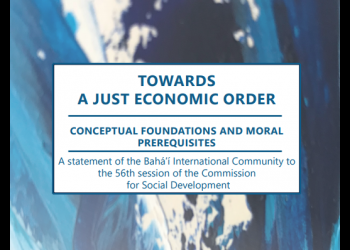Addressing poverty through the construction of a more just global economic order
Lasting progress toward more just and equitable global economic order will require a new framework for thought and action: one grounded in the moral, cultural, and social dimensions of individual and collective life.
So suggested a statement of the Baha’i International Community to the 56th Commission for Social Development, taking place 29 January--7 February 2018. The priority theme for the Commission is “eradicating poverty to achieve sustainable development for all.”
“Humanity has employed countless conceptual models throughout its history, their various elements contributing to progress in some instances and hindering it in others,” says the statement, entitled “Towards a Just Economic Order: Conceptual Foundations and Moral Prerequisites.”
“But regardless of what has come before, it is clear that the transformational change required today calls for new vantage points from which to explore challenges, assess realities, and imagine solutions. We must therefore be prepared to assess--and if necessary, revise--the assumptions that have shaped the current international order and structures of society.”
The statement calls for a thoughtful reassessment of commonly accepted propositions, such as the notion that humanity is inherently contentious and conflict is unavoidable, or that human behavior is driven primarily by self-interest, and prosperity must therefore be based on the pursuit of personal advantage.
Toward this end, the Baha’i International Community calls on Member States and others at the Commission for Social Development “to initiate a profound reevaluation of the assumptions on which development initiatives rest,” and to “ensure that the policies being undertaken by the international community are consonant with the values it is espousing.”
Such a review of the international community’s framework for collective thought and action cannot be limited to a one-time initiative, the statement suggests. Rather, it calls for “deep reflection, woven into the ongoing functioning of the entire United Nations system,” supporting a thorough reassessment of “foundational beliefs about ourselves, the nature of our relationships, and the realities shaping the world we live in.”
The entire statement can be read here. Thoughts and feedback on the ideas it explores are warmly welcomed here.
